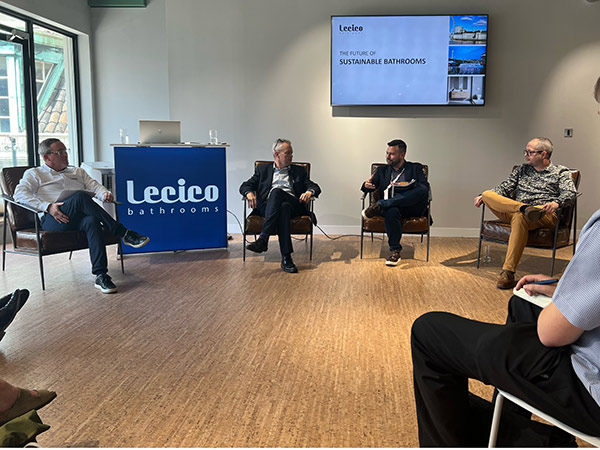Everyone operating in the KBB sector has a responsibility to highlight the commitments being made to sustainability, according to a panel of industry experts.
Speaking as part of a discussion titled “The Future of Sustainable Bathrooms,” the panel session – which was led by Lecico’s head of marketing, Sean Foley – included Antony Thompson, managing director, Lecico Bathrooms, Tom Reynolds, CEO Bathroom Manufacturers Association (BMA), and Lee Jones, head of sustainability at construction data company Byggfakta.
The overriding message from the discussion was that the KBB industry – including installers, specifiers, retailers and manufacturers – must understand thy have a key role in ensuring the sector plays its part in creating a more sustainable future.
“We have a collective responsibility” said Lecico MD, Athony Thompson. “It’s about taking responsibility as KBB professionals to solve the problem.”
When asked about whether consumers were aware of the sustainability efforts that manufacturers were making with products, Thompson said: “I don’t think they are, and I think it’s partly the fault of the manufacturer, partly the fault of the retailer, and a little bit the fault of the consumer. As manufacturers, we don’t have enough products in that space that do the things that we need them to do, and I don’t think we necessarily train the retailers well enough.
“After we’ve supplied the products, they’re responsible for selling it to the person who walks into the showroom. I’m not so sure that retailers are putting sustainable products front-and-centre in the showroom – they’re sometimes tucked away in the back corner because you don’t necessarily make the best profit margin on the sustainable option.
“As manufacturers, we’ve got to do more to help the retailer to help the consumer.”
The panel was also asked whether they felt retailers were doing enough in the push for sustainable solutions, and if not, what could be done to support retailers this key area.
Tom Reynolds answered: “I’ve sat on roundtable discussions with retailers, and sometimes their view was that consumers weren’t really interested in sustainability, and that it’s the responsibility of the manufacturers – not theirs – to educate consumers.
“I’m sorry to say, that’s simply just not the case; the answer is shared responsibility, from the manufacturers through to the consumer, and we’ve got to learn to communicate the credentials of the products to ensure that that message is going all the way through.”
Tom Reynolds then added: “We did some research in 2022 to understand consumer trends around sustainability. We found that sustainability and water efficiency have grown as things that consumers are looking for as they do the research for a new bathroom. But when it comes to entering into a dialogue with either the installer or the retailer, that’s where it stops. We might not be using our expertise to inform a conversation with our customers.”
Broadening the discussion beyond manufacturers and retailers, Thompson explained why he felt that installers also had a responsibility to help educate consumers on making more sustainable choices.
“There’s also a part to be played by the installer,” he said. “Tom [Reynolds] and I are both very friendly with Damien [Walters] CEO of the BiKBBI, and he always talks about how there aren’t enough installers, therefore if there aren’t any new installers, then the existing ones will typically default to a product that they know they can fit easily and quickly. I can understand where that mindset comes from looking from a business point of view.”
When asked if there were any other potential factors of note in the sustainability discussion, Reynolds said: “I think given how sustainability is being incorporated into marketing, consumers are getting more savvy and understanding the topic a lot more. Regulations are also being put into place too, so there’s also a government approach now to push sustainability. So, whether there’s the demand necessarily from the consumer for it or not, by default there’s going to be more desirability for it.”
Elaborating upon how this will impact retailers, Reynolds explained: “The government’s definitely showing an increased interest in sustainability, so for retailers, selling sustainability is going to become a need for them in one of two ways. Either voluntarily, where they display things like water labels and actually learn about the sustainable credentials of the products they’re selling, so they can become a thought leader around sustainability use that in dialogue with the consumer as a kind of upsell opportunity.
“There are going to be things like mandatory water labels, defined water flow rates on showers as well as flush rates on toilets, and that’s going to affect your choice and your availability to provide that value-add for your business.”
When asked about what the next steps look like for the KBB industry’s push for sustainability, Lecico’s Thompson said that it is all about product innovation and education.
“We need to continue to do a better job of creating products within the space,” he said. “We also need to do a better job of educating downstream about these products and the benefits of them.
“As the market for these products gets bigger, you would expect to see more economies of scale – it might help us to make them a little bit more cost-effective. I don’t necessarily think a consumer is going to pay double the price for a product that’s more sustainable.”

